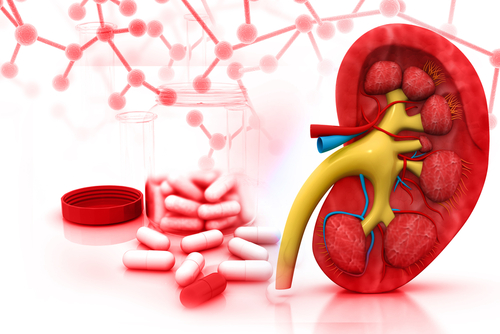Two studies presented at ASN Kidney Week show that common drugs used to treat heartburn, acid reflux, or ulcers, such as proton pump inhibitors (PPI) or histamine receptor-2 blockers (H2), may be harmful for the kidneys. The studies highlighted these medications as risk factors for the development of kidney stones, and, in the case of PPIs, of chronic kidney disease and kidney failure.
In the study, “Proton Pump Inhibitors, Histamine Receptor-2 Blockers and the Risk of Incident Kidney Stones” (Abstract 931), conducted by Pietro Manuel Ferraro, MD, with Catholic University of the Sacred Heart in Rome, and colleagues, information on 187,330 participants of the Health Professionals Follow-up Study, and the Nurses’ Health Studies I and II, were evaluated on what regard to PPI or H2 use.
During 12 years of follow-up for PPI use, and 26 years for H2 blockers, 3,245 incidents of symptomatic kidney stone were described. The researchers, using a multivariable analysis that adjusted for such factors as age, smoking history, physical activity, comorbidities and body mass, associated the use of PPIs with a 12% higher risk for kidney stones, and H2 blockers with a 13% higher risk.
PPI and H2 blockers can alter the urinary excretions of the components of kidney stones, like calcium and magnesium. The researchers observed that patients undergoing PPI treatment had lower urinary excretion of calcium, oxalate, citrate, and magnesium, further confirming the links observed.
“Use of PPIs and H2 blockers is associated with a small increase in risk of incident kidney stones,” Ferraro said in a press release. “Further studies are needed to confirm our findings and to investigate whether the excess risk is related to a particular type of kidney stones such as those made of calcium oxalate.”
Yan Xie, with the VA Saint Louis Health Care System, and colleagues conducted a second study, “Long Term Kidney Outcomes Among Proton Pump Inhibitors Users Without Intervening Acute Kidney Injury” (Abstract 3495), aiming to confirm the accepted assumption that chronic kidney disease due to PPI use is a consequence of incomplete recovery from acute kidney injury (AKI).
More than 150,000 people using PPIs or H2 blockers, with no history of acute kidney injury, were evaluated to determine if a link existed between the use of these drugs and the incidence and progression of chronic kidney disease (CKD), and end-stage renal disease. Patients studied were registered in the Department of Veterans Affairs national database.
Findings showed that PPI consumption is associated with a 30% increased risk of developing CKD, a combined endpoint of kidney failure, or 50% decline in kidney function (estimated glomerular filtration rate) compared to H2 blocker use in non-AKI patients.
“Reliance on AKI as a marker of potential adverse renal events in those treated with PPI is not sufficient,” Xie said. “Exercising vigilance in PPI use — even in the absence of AKI — and careful attention to kidney function in PPI users may be a reasonable approach.”

